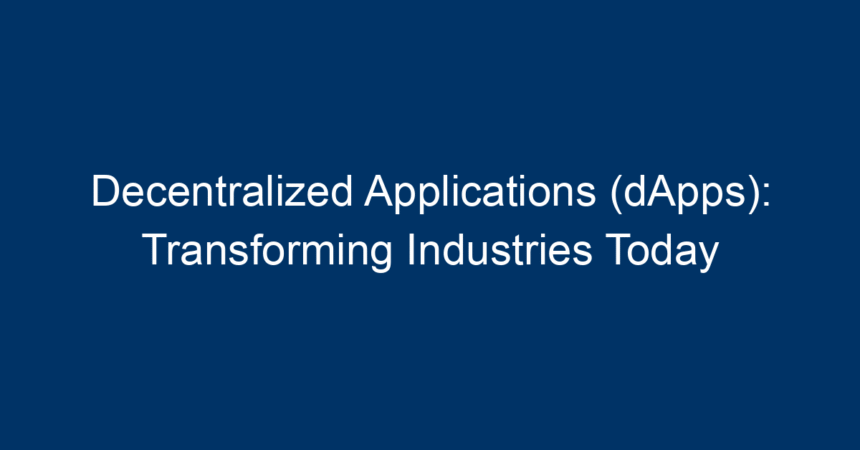In the age of digital transformation, decentralized applications (dApps) are emerging as a revolutionary force across various sectors. Harnessing the power of blockchain technology, these applications promise not only enhanced security and transparency but also the potential to disrupt traditional business models. With a myriad of industries eager to explore this innovative frontier, understanding the mechanisms and benefits of dApps is essential for businesses looking to thrive in this evolving landscape.
What Are Decentralized Applications (dApps)?
Decentralized applications (dApps) are software applications that run on a blockchain or a peer-to-peer network, rather than relying on a centralized server. Unlike traditional applications governed by single entities, dApps operate autonomously, promoting transparency and security. They leverage smart contracts—programmable agreements that execute automatically when certain conditions are met—to facilitate processes that typically require trust between parties.
Key Characteristics of dApps
-
Decentralization: dApps utilize distributed ledger technology, ensuring that no single party has control. This minimizes the risk of data manipulation and enhances security.
-
Open Source: Most dApps are open-source, allowing developers and users to contribute to their codebase, fostering innovation and community collaboration.
-
Incentivized Token System: dApps often incorporate a native cryptocurrency or token to incentivize user participation and ensure smooth protocol functioning.
- Smart Contracts: These are self-executing contracts with the terms of the agreement directly written into code. They reduce the need for intermediaries, streamlining operations.
The Impact of dApps on Various Industries
1. Finance and Banking
The financial sector has been one of the earliest adopters of decentralized applications. Traditional banking systems often involve lengthy processes, fees, and trust issues. dApps can provide solutions such as:
-
Decentralized Finance (DeFi): DeFi platforms enable users to lend, borrow, trade, and invest without the need for traditional banks. This not only reduces costs but also increases access to financial services for the unbanked population.
- Smart Lending: Platforms like Aave and Compound allow users to lend or borrow cryptocurrency seamlessly through smart contracts, offering higher interest rates compared to traditional savings accounts.
2. Supply Chain Management
Supply chains are often riddled with inefficiencies and lack transparency. dApps can help streamline processes by enabling:
-
Real-time Tracking: Blockchain-based dApps allow for real-time tracking of products from origin to consumer, enhancing accountability and reducing fraud.
- Smart Contracts for Compliance: Businesses can automate compliance and contractual agreements within the supply chain, ensuring all parties meet obligations before transactions are executed.
3. Healthcare
The healthcare industry can greatly benefit from the transparency and security offered by dApps:
-
Patient Data Management: dApps allow patients to have control over their own health data, granting access only to healthcare providers when required, thus enhancing privacy.
- Drug Traceability: Decentralized applications can track pharmaceuticals at every step, combating counterfeit drugs and ensuring the integrity of the supply chain.
4. Real Estate
The real estate sector is known for its complexity and high costs associated with transactions. dApps can transform this industry by:
-
Property Tokenization: By tokenizing real estate assets, dApps enable fractional ownership, making investing in real estate more accessible for the average person.
- Transparent Transactions: Smart contracts can automatically execute property transactions once certain conditions are met, significantly reducing the need for intermediaries and lowering transaction costs.
5. Gaming and Entertainment
The gaming industry has seen substantial interest in dApps:
-
Play-to-Earn Models: dApps that incorporate blockchain allow players to earn real rewards through gameplay, creating new economic ecosystems.
- True Ownership of Assets: With dApps, players can truly own in-game assets (like skins, characters, and items), as these items are represented as non-fungible tokens (NFTs) on the blockchain.
Challenges and Considerations
While the potential of decentralized applications (dApps) is immense, several challenges need addressing:
1. Scalability
Many blockchain networks face scalability issues, which can hinder the performance of dApps. As user demand increases, maintaining speed and functioning can become problematic.
2. User Experience
The complexity of using dApps can deter non-technical users. A focus on user-friendly interfaces is crucial for mass adoption.
3. Legal and Regulatory Concerns
As dApps gain popularity, regulatory bodies are starting to take notice. Navigating the complex legal landscape while maintaining decentralization can prove challenging.
4. Security Risks
Despite the inherent security features of blockchain technology, vulnerabilities still exist. Developers must prioritize security to protect users.
The Future of dApps: What Lies Ahead?
As we look towards the future, the evolution of decentralized applications (dApps) is expected to accelerate:
1. Increased Adoption
Industries across the board are beginning to realize the advantages of dApps. With more businesses looking to integrate these solutions, we can expect widespread adoption in the coming years.
2. Interoperability
Ensuring dApps can communicate across different blockchains will enhance user experience and broaden their applications. Solutions for interoperability are already in development.
3. Enhanced Regulations
As dApps become more mainstream, clearer regulatory frameworks will emerge, enabling businesses to innovate without the fear of regulatory backlash.
4. Improved Scalability
Advances in blockchain technology, such as Layer 2 solutions, promise to solve current scalability issues, paving the way for faster and more efficient dApps.
Actionable Insights: Embracing the dApp Revolution
As a business leader or entrepreneur, the rise of decentralized applications (dApps) presents a unique opportunity to innovate:
-
Education: Invest time in understanding dApps and blockchain technology. Attend webinars, participate in workshops, or even take online courses.
-
Pilot Programs: Consider launching a pilot program to explore how dApps could enhance your operations, whether in finance, supply chain management, or other relevant areas.
-
Collaboration: Partner with tech companies specializing in blockchain solutions to gain insights and access to cutting-edge technologies.
- Adapt and Evolve: Keep an eye on industry trends and adapt your business model accordingly. The ability to pivot will be crucial as the landscape continues to change.
Conclusion
Decentralized applications (dApps) are at the forefront of a technological revolution that is rewriting the rules across multiple industries. As these applications become more sophisticated and user-friendly, their impact will only grow. By understanding their potential and preparing to incorporate dApps into your business strategy, you can position yourself at the helm of this transformative wave. The future is decentralized—will you be part of the change?




